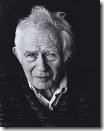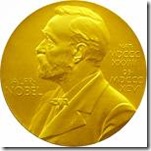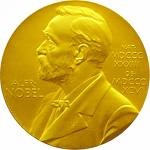There was an interesting article in the Guardian this week asking whether or not young female writers are operating at a deficit when it comes to major literary awards. Not due to any shortcomings on their part, but because (as the author posits) "the literary industry as a whole – agents, editors, booksellers and critics – currently offer disproportionate encouragement to aspiring male writers to produce the kind of serious-minded, bookish work that gets on shortlists, compared to young female writers." The argument being that for whatever reason, publishers prefer discovering the next Norman Mailer to finding another Toni Morrison.
comes to major literary awards. Not due to any shortcomings on their part, but because (as the author posits) "the literary industry as a whole – agents, editors, booksellers and critics – currently offer disproportionate encouragement to aspiring male writers to produce the kind of serious-minded, bookish work that gets on shortlists, compared to young female writers." The argument being that for whatever reason, publishers prefer discovering the next Norman Mailer to finding another Toni Morrison.
I’m not entirely certain I agree with this, but it’s an interesting piece, particularly since it was written by a young male author. I also did a quick head count, and during the past two decades only five women have won the Nobel Prize for Literature. Five  women won the Man Booker Prize. Only with the Pulitzer did women even approach parity, with eight out of twenty taking home the prize.
women won the Man Booker Prize. Only with the Pulitzer did women even approach parity, with eight out of twenty taking home the prize.
This got me thinking about gender bias in our own neck of the woods. When my agent first called to sign me, she was noticeably taken aback. Toward the middle of our conversation she confessed that after reading THE TUNNELS, she’d thought I was a man (though the name "Michelle" was pretty straightforward, in my opinion). Since the subject matter was so dark, she felt it might appeal to more male readers than female ones. She recommended that I consider adopting a pseudonym, or shortening my name to just the initials (sadly, that would leave me "M.A.Gagnon," which doesn’t exactly trip off the tongue, and sounds like something the Mayo Clinic might have a specialized treatment for).
In the end, I opted to stick with my full name. Partly because I didn’t entirely believe that gender bias exists, partly because I’m just obstinate that way. But I do wonder. When I meet people at conferences who have read my books, the universal exclamation is, "but you seem like such a sweet girl." I suspect that very few male authors are referred to as "sweet" when they meet their fans, or hear that they seem "too happy to write these sorts of books."
Impossible to say whether or not it affects my sales. Occasionally this question rears its head on one of the mystery discussion groups, and everyone gets up in arms. Most people declare that they will happily read any book regardless of who wrote it. But does that apply to the world at large? Especially since I don’t write cozies (which are marketed more toward women), but thrillers, is my name working against me?
Where do you stand? Will you read anything by anyone? Or does gender bias sneak into your decision-making process, subconsciously or otherwise?




When I was young, my father told me that men were better writers than women. So from day one as a writer, I always used my initials on my byline so that no one could prejudge my work. I think it is likely that some men won’t buy novels written by anyone with a feminine name. But then, there may be women who only buy novels by female writers. Once people know your work, your name shouldn’t matter.
I used to favor gender neutral names. But nowadays, it seems to me that more women read than men. I never think about whether the author is male or female when making my reading choices so I’m at the point where I wouldn’t hide my gender (though hey, if a publisher asked me to, I suppose I would consider changing my mind).
I dunno, this whole campaign season really made me realize what an ostrich I’d been the last few years about not acknowledging sexism in society. So I wouldn’t rule out that it’s a factor in literary fiction and how it’s regarded.
Sisters in Crime was organized over twenty years ago to counteract the gender bias in crime fiction. If I remember this correctly, and I may not, a recent SinC study indicated almost as many authors of crime fiction are female as male these days. So they’ve made progress for us! However, more recently, they’ve found that male authors receive more reviews.
Carolina Valdez
http://www.carolinavaldez.com
I judge a book by the quality of the writing, not the gender of the author. I also think there’s just as much bias regarding age as gender.
I think most women over 45 assume that there’s a certain level of gender bias that exists in many aspects of society (along with ethnic, age, and sexual-orientation bias). In the 60’s and 70’s, discrimination against women was rampant. The situation has gradually improved, but I believe we still have a long way to go. I’m currently writing a paranormal, dark thriller, and I’m considering using a pseudonym for that genre The last name of the pseudonym is based the name of one of my male ancestors. I’ll find out if his name sells more books (grin)!
While the prize-related evidence seems to be compelling, it’s still an awfully small statistical sample. I’m not saying there isn’t a bias; I just think that’s not the best argument to make. Sales may be a better indicator.
I guess what makes me doubt sexism plays too great a role in publishing is the great number of women in positions of authority. I don’t know the numbers, but my personal experience implies women are fully reprsented in the agent and editor fields, which leads me to wonder who is discriminating against them.
I am also aware that publishing, especially in the prize areas, is still prone to good old boy cronyism masquerading a “good taste.” As I said, I’m not saying it doesn’t exist; why should publishing be different from most of the rest of society? Just that the research is lacking in this instance.
I will admit to reading predominantly male writers, but that is largely because men have been more likely to write the kinds of books I like to read. (Hard-boiled, realistic crime fiction with some appropriate humor.) This has changed in recent years, and my reading has reflected that.
My book, STALKING SUSAN, has a bright yellow cover. When I first showed a picture of it to a male friend, he replied, “I just buy books with black covers.” I think what he was saying was he preferred books by men. He ultimately bought my book and said he really liked it. But if it wasn’t mine, I don’t know if he would have tried it blind.
I thought the finding by SinC was interesting, Carolina. And I do wonder how the sales pan out along gender lines, at least for thrillers. It would be interesting to see. My father will generally read anything, but favors spy novels- and when I mentioned Gayle Lynds’ series to him, he definitely raised an eyebrow. A woman, writing spy novels? Joe, I’m curious: age bias had never occurred to me, do you think it’s on the part of the agents/editors? Because I’m not sure how the general public would know (case in point: I just found out yesterday that Jeff Lindsay had a cameo on Dexter last week, and realized when I watched it again I had a completely different image of him in my mind, having never seen his author photo before).
I’m interested it was a man who write that article. Some guys like to go on about the sexism facing women. I suspect that, tho’ they’d never in a million years admit it, it reassures them that men are still in control. To me, it would be really hard to posit the notion of male dominance in modern publishing. Both the president of my publishing house and the corporation to which it belongs are women, for example. An at a junior level I’d guess that women make up the majority of most publishers’ editorial staffs. Certainly, the vast majority of fiction readers are women, and while women are prominent as both writers and readers in the supposedly ‘male’ area of crime-writing, you won’t find many guys writing or buying chick-lit. And that jokey, condescending genre-name hides serious sales and massive author-royalties. I’m also interested in the idea that female writers have to face skepticism about their legitimacy in crime fiction … Out of curiosity, by the way, was it men, or other women who wondered how a sweet girl like you could be writing crime? I’d guess women wee at least as culpable: its other women’s opinions that always seem the most condescending, sexist and sometimes savage towards women, from my male perspective. It’s hard to imagine anyone would be surprised by a woman crime-writer, though. Certainly the tradition of women in the British crime fiction with which I grew up is incredibly longstanding and powerful, from Agatha Christie to PD James and on to the current Mo Hayder/Zo Sharp/Martina Cole generation. Same in the States with Patricia Cornwell, Tess Gerritsen, etc, etc. Which leads me to one last point, which struck me reading one of Gerritson’s books – The Surgeon, I think it was. Confronting one of her incredibly powerful, gory, forensic accounts of horrific violence done to a young woman’s body, I thought that if I ever described a mutilated female that way, people would think I harbored some seriously sick, misogynist fantasies. Yet no one questions a woman’s description. I sometimes think women are if anything freer to express themselves to day – given three or four decades of increasing PC awareness – than men. We, after all, may be in power. But we are also in the wrong. As any woman surely knows! 🙂
Great post Michelle! I think MJ Rose spoke about this on one of the thriller panels at Bouchercon and she definitely thought there was still bias. In my area – historical mystery the field is probably dominated by women but I think perceptions are still that women write ‘lighter’ mysteries. Hard to quantify but the bias I suspect is still out there in the ether…particularly for noir and darker thrillers – an assumption perhaps that ‘sweet girls’ would never write such things??? I certainly don’t take gender into account when I buy books but I think given the predominance of women readers in the historical field the bias may actually work in our favor. At the HNS conference two years ago it was said that most historicals need strong female lead characters to be marketable (which may be more of a challenge for a man to write who knows?). I guess the whole bias issue is intangible and hard to quantify but I suspect that there is still bias out there – peope just don’t like to admit it.
A lot of my must-read authors are women. Tess Gerritsen, Laura Lippmann, JT Ellison, Tasha Alexander, Zoe Sharp, you…
Vicki Hendricks, Megan Abbott, Christa Faust…
Interesting points, Tom. I’d say I get the comment fairly equally from both men and women, but I know what you mean. I consider myself to be gender blind with regard to my own reading habits, but suspect there is a bias out there.
I also wanted to point out that having women in positions of power in the industry doesn’t necessarily negate bias. As Tom mentioned, sometimes women can be our own worst critics. I found something similar during my dance career: despite the fact that 80% of the dancers were women, it was the men who almost invariably received funding and became choreographers (and even the female choreographers tended to worship the men, and to be relentlessly critical of the women; don’t even get me started on Twyla Tharp). It always struck me as very odd and unbalanced.
I think you did the right thing sticking with your name, Michelle. First off, I know of a number of male authors who have used ambiguous female names in order to woo female readers (no, Joe Konrath I’m not talking about you 🙂 ) I just don’t see the need to change a name to sound more male–much better off appealing to female readers. Also, going by the Agatha, Edgar, and Anthony winners of recent years, I think women are doing pretty well in that regard…Besides, with a first novel how could anyone want to use a pseudonym? I know I wanted to stick it to all of the writing and English teachers who doubted me(not to mention a few ex girlfriends 🙂 )
Great post!!
Jason Starr
Ms. Gagnon,
I can’t speak for industry-wide bias, but I can say that I’ll read pretty much anything recommended to me by someone whose opinion I trust. As such, I’ve read Laura Lippman, JT Ellison, Zoe Sharp, Tess Gerritsen, Kathy Reichs, Alex Sokoloff, Allison Brennan, Lori G. Armstrong, and your second book. Most, if not all, kept me up reading MUCH later than I should have stayed up (and left me grumpy trying to teach the next day). And I can’t think of a single one that wasn’t great. So, no bias here.
I don’t know that anyone here can accurately say, Michelle. We’re all open to the idea. The average guy or gal on the street who maintain that they love mysteries but only read the big names may fall, wittingly or not, along gender bias lines.
I see it to a certain extent in the shop. We have customers who maintain they’ll only read books by women or by men, but those are rare. I suspect it happens more than that; they’re just not as blatant about it.
Somehow people expect “mysteries” to be written by women (a la Agatha Christie) but thrillers to be written by men. It’s never spoken, just oddly assumed.
Not but folks whose lives revolve around the genre, you understand. But by the folks I see coming in on a daily/weekly/monthly basis.
Oh, spy-novel-wise, you might tell your dad about Stella Rimington. And when he raises his eyebrow to her, tell him she’s the former head of MI-5; that should make him smile!
Thanks, Fran! And yes, Jason, I have to admit that might have entered into my decision-making process, sad to say…
Talent is what leaves it’s mark on me. And if there’s a pretty face on the dust cover, there’s more of a chance I will look at the dust cover twice. The important part though is the words in between.
I think an important way to overcome a perceived bias against female writers is to not publish the book with girly coloured covers. If you want men to read it, whatever sex the author may be, make the cover look masculine and away you go, they’ll pick it up. Especially if there are cool pictures of explosions or people with guns, etc.
By the way, I could understand your agents confusion Michelle. My next door neighbor is a French guy named Michelle…ex Foreign Legion sort…not too feminine….and no one asks about his name, at least not twice.
As a man who’s been told he should write under a female pseudonym, frankly, I think it’s silly that anyone should care which gender the author is, if the book is any good. But that’s just me.
I have noticed Testosterone patches for women being advertised.
Perhaps a catagory for women writers delving into the dark male world with hormone assistance. It would make for interesting reading.